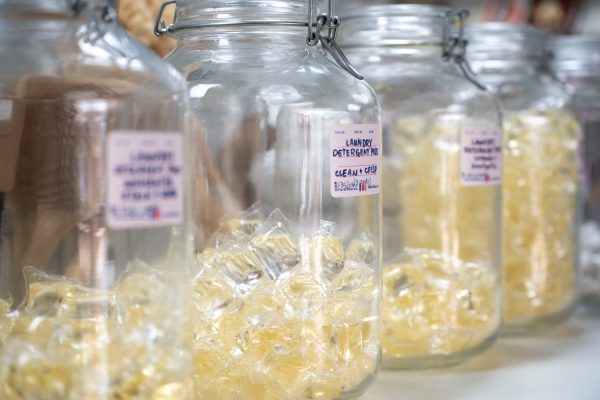UI researchers find benefits of dietary supplement in nursing mice
Professor Charles Brenner and his research team recently discovered the benefits of nicotinamide riboside in nursing mother mice.
Charles Brenner poses for a portrait in his lab on Jan. 28, 2019.
January 29, 2019
Researchers at the UI have recently discovered the benefits of nicotinamide riboside in nursing mice and their offspring, and they hope for similar outcomes in nursing human mothers.
Fifteen years ago, Professor Charles Brenner, the head of the University of Iowa Biochemistry Department, helped discovered NR, a dietary supplement that was protective in conditions of metabolic stress and protected damaged nerves.
“I was thinking about metabolic stress and what type there is that we don’t necessarily believe as a disease,” Brenner said. “Then I began thinking about pregnancy and postpartum, and soon after, we began to test the NR.”
Mouse mothers were given the dietary supplement while they were nursing their offspring and, ultimately, had offspring with behavioral benefits. It also allowed for mothers to produce more milk than those that had not received the supplement while nursing, Brenner said.
A nursing mother’s nicotinamide adenine dinucleotide system — a coenzyme found in all living cells — is highly regulated in postpartum, he said.
“If you support the mother’s NAD supply, she begins to develop these benefits,” he said. “Not only is she producing more milk, but also, more bioactive molecules are present in the milk, which is beneficial for the offspring. She also is more likely to spend more time nursing and the offspring will, in turn, develop better.”
RELATED: Inflammation in the womb can cause autism-like traits, UI study says
NR is currently available over the counter in a supplement called Tru Niagen, Brenner said.
Where the struggle came from, he said, was that drug companies believed the supplement was too inexpensive to invest in.
“I was frustrated that drug companies were not developing this molecule as a drug for the people that would benefit the most,” Brenner said.
UI Associate Professor Hanna Stevens, the division director of child psychiatry, said her primary focus in the research was on the brains of the developing offspring.
We still need to look at the safety profiles of people. We are very protective of nursing moms and have to carefully examine the NR and ensure that we aren’t putting any individuals in harm’s way.
— Hanna Stevens
“This intervention altered the developing offspring and their behavior,” Stevens said. “Their brains are developing faster and more resilient.”
Stevens noted that while the researchers are excited about the possibility to examine the supplement in people, there is still a lot of research to do about the safety of the supplement.
“We still need to look at the safety profiles of people,” Stevens said. “We are very protective of nursing moms and have to carefully examine the NR and ensure that we aren’t putting any individuals in harm’s way.”
Sirgeru assistant research scientist Po Hien Ear said her interest is in what benefits the supplement created for DNA.
“I entered into this project because of my interest in vitamin B3, as NR is a form of vitamin B3,” Ear said. “It’s overall good for development, and we are attempting to continue the research that many have found too complex to solve in the past.”
Ear stressed that what sets this research team apart from others is the many levels of expertise.
“It has been a pleasure to work on this project,” she said. “From biochemistry to psychiatry to behavioral studies, we all came together to solve this.”






















